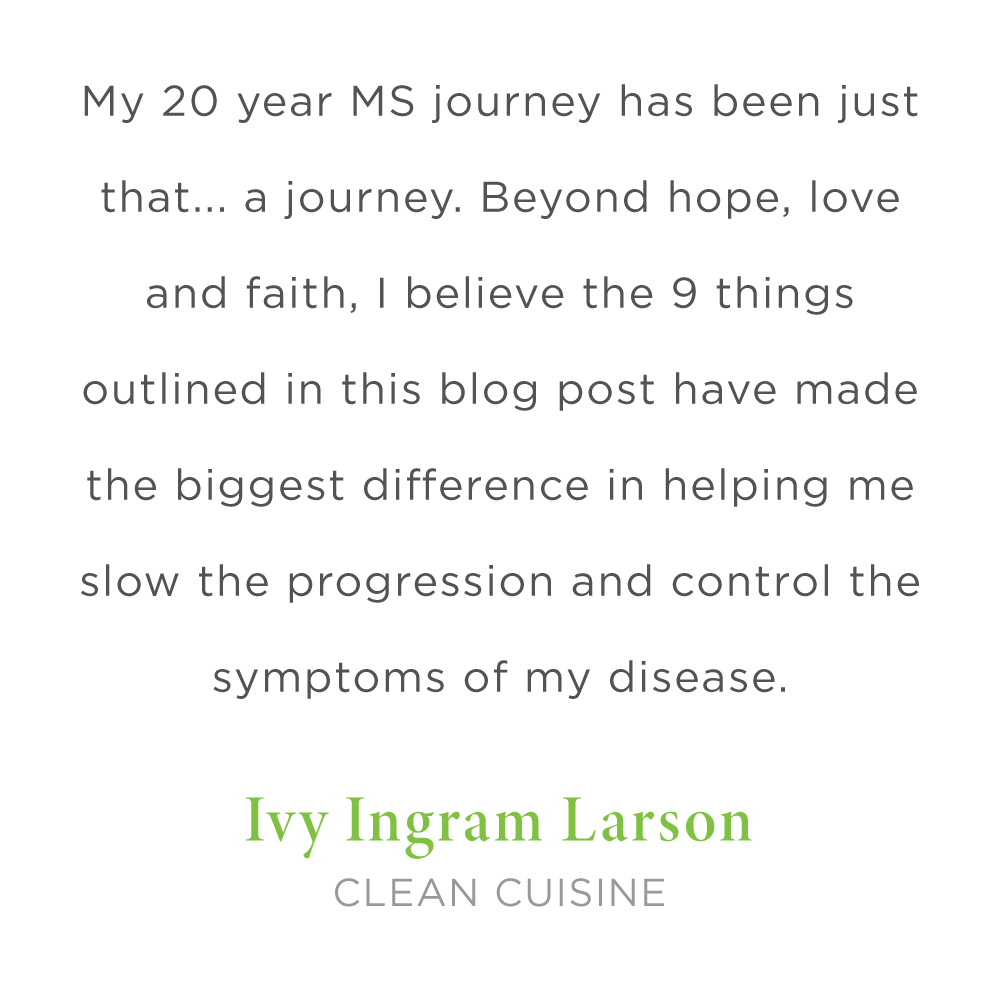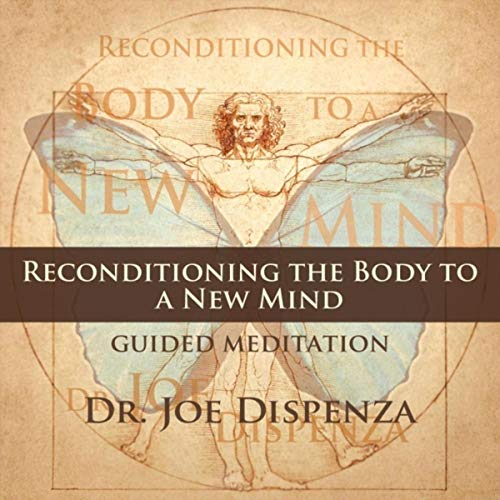My Multiple Sclerosis Journey
Note: My MS story is divided into a 5 part blog post. If you missed part 1, 2 and 3, click on the links below before reading part 4.
My 9-Step Plan for Keeping My Multiple Sclerosis Symptoms In Remission for 20 Years

Ok, beyond hope, love and believing, what else do I think played a role in managing my MS symptoms for the past two decades? Lets get down to the nitty gritty.
Step 1: Start a Plant-Forward/ Anti-Inflammatory Diet
The first step I made in my lifestyle makeover was to change my diet. Of all the many, many things I have done, I believe diet has made the most impact, but it would be irresponsible of me to credit diet alone.
As mentioned in part 2 of my MS story, at the recommendation of my neurologist, I started with the Swank Diet for Multiple Sclerosis, which mostly consisted of reducing my intake of animal food, limiting my animal-base saturated fat to less than 15 grams a day, increasing my intake of fruits and vegetables and eliminating processed food (especially trans fat) and refined sugar. These are healthy diet guidelines for anyone by the way.
As time marched on, I started to understand the importance of nutrient density and I started to focus on adding more superfoods to my diet. And by superfoods I mean foods that offered mega nutrition for very few calories (such as hemp seeds, chia seeds, seaweed, cacao, etc.) I also started to heavily emphasize even more fruits and vegetables. If you look at our anti-inflammatory food pyramid below, youll see fruits and vegetables form the foundation of the pyramid, which was not the case when I first started.
You can read more about the diet I follow in the following links:
- New to Clean Cuisine? START HERE!
- 20 Years of Clean Eating: What Has Worked for Me
- My Clean Eating Journey Update (and What I Have Changed Over the Years)
- Clean Cuisine Defined
In addition to the links above, I go into great detail on the anti-inflammatory diet I follow in all five of our books.The most updated versions are these two:
- Clean Cuisine: An 8-Week Anti-Inflammatory Nutrition Program that Will Change the Way You Age, Look & Feel
- The Clean Cuisine Cookbook: 130+ Anti-Inflammatory Recipes to Heal Your Gut, Treat Autoimmune Conditions and Optimize Your Health (***Note: the first 100 pages are on nutrition and include the anti-inflammatory food pyramid below***)
The Anti-Inflammatory Clean Cuisine Food Pyramid
The 7 Anti-Inflammatory Clean Eating Food Guidelines I Follow:
This is interview (below) I did a while back on FOX News gives a good overview of the 7 dietary principles I follow today:
I talk about more about how the diet works for MS in this CBS Dallas interview below:
And in this interview below I talk about the 10 Anti-Inflammatory Diet Dos and Donts from the Clean Cuisine Cookbook:
And finally, I also talk in more detail about the diet I follow in below in this blog post on my 19 year clean food diet journey.
Step 2: Start a Moderate-Intensity Exercise Program
Exercise is medicine and to not exercise is to not take advantage of one of natures most powerful natural medicines. Considering that weakness can be one of the most bothersome and disabling symptoms of MS, the last thing anyone with MS wants to do is get weaker! Regardless of whether you have MS, the only way to not get weaker with age is to exercise.
Years and years ago neurologists would tell their MS patients not to exercise and to go home and get some rest. That was downright terrible advice because whether or not you have MS, if you stop moving, your muscles will start to atrophy and you will get weaker. Not only will your muscles get weaker, but so will your cardiovascular system. And one thing is for sure, it will be a lot more challenging to manage any autoimmune disease if you dont have strong muscles and a strong cardiovascular system. The stronger and more fit you are, the easier it will be to manage MS. There are numerous reasons to exercise, but most people with MS dont realize that in addition to improving strength, cardiovascular health and flexibility, just 20 minutes of exercise also acts as a powerful anti-inflammatory.
I was very fortunate that my neurologist at the University of Miami did not tell me antiquated advice regarding exercise. In fact, at the time I was diagnosed with multiple sclerosis I was actually a certified health fitness specialist with the American College of Sports Medicine and I was working as a fitness instructor at a hospital based wellness center. My neurologist specifically encouraged me to continue to exercise. The only two things he told me to watch out for were 1) overheating, since heat can exacerbate MS (this was especially relevant to me since we lived in Florida!) and 2) overexertion, thats because if youhave an active autoimmune disorder, it is thought that you only have so much energy to spend in one day so you therefore need to budget your time and energy.
How do you know if you have overdone it with exercise? If you feel exhausted and/ or shaky after your workout, then youve done too much. My rule of thumb when it comes to exercising with MS is that I want to always feel better and more energetic when Im done with my workout. If I dont feel better after a workout than before I started then its almost always because I have done too much. This is especially true with endurance exercise. I just dont seem to ever feel really well if I do too much cardio. I think the most important thing to do when it comes to exercising with MS is to simply listen to your body.
Focus on Strength Training for MS
I truly cant emphasize the importance of exercise enough if you have MS. But walking is just not going to cut it. You really do need to incorporate full body resistance training exercise to strengthen the muscles. Believe it or not, resistance training indirectly plays a key role in reducing whole body inflammation. One reason is because resistance training builds muscle and having muscle will increase your metabolism and keep your body fat healthy and low. And having a healthy body fat percentage plays a big role in keeping whole body inflammation down because body fat promotes inflammation in and of itself. Stretching is also extremely important for MS patients to prevent spasticity.
I could write a whole blog post on the best types andbenefits of exercise for MS, but I encourage you to check out our FUSION FITNESS section on the website featuring lots of free YouTube videos and exercise science articles.
20 Minutes of Exercise Reduces Inflammation
Again, exercise has been proven to reduce systemic / whole body inflammation, which is exactly what you want to do if you have MS!
Exercise has always been such an important component to my holistic approach to managing MS that we even dedicated entire chapters to explaining our philosophy on fitness as well as presenting whole body workout programs in three of our books, including the Clean Cuisine nutrition book. I wont get into it all here, but functional fitness is a big part of our exercise philosophy. Whether you have MS or not, its just not enough to do cardio, especially after the age of 35. The best workout program from someone with MS is a well rounded routine that incorporates strength training for all the major muscle groups, moderate cardiovascular exercise and full body stretching.
In addition to including exercise on the blog and in the books, I created a Full Fitness Fusion 30-minute workout DVD (see below) as the anti-inflammatory companion workout to our Clean Cuisine nutrition program. The Full Fitness Fusion workout DVD was filmed just six months after my 2nd hip surgery, and only a few short weeks after I started walking again. I emphasize this because the workout truly is a no-impact routine that is modifiable for almost all fitness levels. I was not yet fully recovered from my hip surgery when I filmed the workout, so I was unable to do any form of impact exercise. But even without any joint-pounding moves, the Full Fitness Fusion workout routine will still enable you to break a good sweat and work every major muscle in your body with zero impact. Its also a good workout for anyone who has had hip surgery (note: my hip surgeries were related to a congenital disorder called femoral retroversion. I had to have two major surgeries, the last one was a derotational femoral osteotamy, which involved breaking my thigh bone in half and rotating the top portion of my femoral head into theanatomicallycorrect position. I mention the surgeries just to emphasize that this really is a workout that can easily be modified if you have orthopedic issues. I also mention the workouts to give anyone facing hip surgery hope that they can absolutely still exercise following surgery.)
Step 3: Start a Basic Nutritional Supplement Regimen
Just like exercise, nutritional supplementation has been a big part of my holistic approach to managing my MS almost from day one. (***FYI: We talk extensively about the importance of nutritional supplements in our original Gold Coast Cure book as well as our Clean Cuisine nutrition book.***)
My neurologist initially made four recommendations for supplements:
- A good multi-vitamin (with full-spectrum B complex) -I like Hardy Nutritionals Daily Essential Nutrients.
- A high quality fish oil supplement with both EPA & DHA -I like Nordic Naturals Ultimate Omega brand. I take 4,000 mg daily, but I also now recommend Nordic Naturals plant-based algae omega-3 as it has both EPA & DHA.
- Antioxidant vitamin C-I use 1 teaspoon whole food camu daily in my Hormone Smoothie recipe (see details below) By the way, one teaspoon of camu has a whopping 1180% of your Daily Value for vitamin C! I talk more about the benefits of camu in this blog post.
- Vitamin D-Did you know vitamin D deficiency has been proven to be a direct contributor to the onset of MS?I likeKlahre Labs vitamin D3. I take 5,000 IU daily.
As I learned more about nutrition and supplements over time, I added the following three:
- Whole Food-based phytonutrient supplement --I like Juice Plus+ OR Green Vibrance.Learn more about the anti-inflammatory and antioxidant benefits of phytonutrients in this blog post.
- Probiotics I take Amare brand Mentabiotics This is both a brand and product specifically targeted to mental wellness, which many people with MS can benefit from.
- Barley Grass and SpirulinaI take 2 teaspoons of barley grass powder and 2 teaspoons of spirulina once a day mixed with water and lemon juice. I like Vimergy brand for both.
- Evening Primrose Oil-I like Barleans brand. I take 1,300 mg daily.
- RESTORE for gut health For a variety of issues, many people with MS and other autoimmune diseases have issues with leaky gut and RESTORE for gut health has been shown in lab studies to strengthen the tight junctions in the gut wall, creating a beneficial shift in gut bacteria and a strengthened immune system. I encourage you to listen to this podcast on GOOP by the founder of RESTORE to learn more.I take RESTORE three times a day with my meals.
Go for Quality Supplements!
I really should emphasize the importance of buying QUALITY supplements and I strongly urge you to do your research if you do not want to use the brands I recommend. I say this because foryears we had our own line of Clean Cuisine supplements and I learned a lot about the supplement industry in that time frame. For a variety of reasons we recently stopped our own line, but in trying to research how to source the highest quality supplements, I learned the rumors about the unregulated supplement industry were more true than I realized. The truth is, you really have to do your research on the companies.
When it comes to nutrition supplements, you most definitely do not always get what you pay for. I learned this first hand while suffering with a pretty significant vitamin D deficiency. My vitamin D deficiency occurred even though I live in yearround sunny Florida and was supplementing with 5,000 IU vitamin D at the time of my diagnosis (you can read more about my vitamin D deficiency story in this blog post.) The bottom line is I was deficient because the supplement I was taking clearly did not have what the label claimed. As soon as I switched brands my vitamin D levels returned to optimal level (above 70 ng/ mL).
Choosing a superior quality multi-vitamin is especially important but can be very tricky if you dont know what you are looking for. I go into great detail on how to pick the best multi-vitamin in this blog post.Keep in mind that if you have MS, chances are very high that you also have the MTHFR gene mutation (I have it) and if so it is particularly important to make sure your multi-vitamin has methylated B vitamins. You also want to make sure you are getting natural vitamin E as opposed to synthetic, mixed carotenoidsand a balance of fat soluble vitamins rather than a mega-dose of any individual one. It is critical to have some iodine in your multivitamin as well as iodine plays a key role in myelin sheath production (I talk more about the importance of iodine in this blog post.) And finally, there has been a lot of research lately on the benefits of biotin for MS. Biotin activates key enzymes that help the body to produce more myelin. However, there are risks to taking mega doses of biotin as too much biotin can potentially cause even more inflammation. The safest thing to do is to just make sure you are getting an adequate amount, but I would not go crazy adding mega doses of biotin until more research is done. For the record, the multi-vitamin I recommend, Hardy Nutritionals Daily Essential Nutrients, has a very safe 360 mcg of Biotin, which is absolutely not a mega dose at 120% of the recommended Daily Value.
Step 4: Manage Stress
I admit I have not always been good at step 4. Managing stress does not come naturally to me. In fact, several years ago I wrote a blog post about how I literally had to go to bed for 4 days to overcome stress. It was either go to bed for 4 days or risk having an MS attack. I really did feel I was very close to having a flare up if I didnt do something drastic. Going to bed did do the trick, but it was obviously a major inconvenience. Since then, I have taken stress management far more seriously and work daily to manage it.
Even though my neurologist heavily emphasized the importance of stress management as part of an anti-inflammatory lifestyle from day 1 of my diagnosis, it took me years to really understand the importance of this recommendation. And then it took me even longer to put stress management techniques into practice. Because lets face it: deciding to manage stress can be easier said than done.
Understanding the Connection Between Our Thoughts and Our Health
I always feel education is one of the best ways to motivate someone. Once you understand the science behind a recommendation to change something about your lifestyle, then putting the change into practice becomes a whole lot easier. If you are on the fence with whether or not stress really affects your body as much as the experts say, I strongly encourage you to watch the Gaia documentary E-MOTIONS.
E-MOTIONS will help you understand what happens inside of your body when you allow stress (or cell chaos) to dominate your life. I choose the word allow because feeling ongoing stress really and truly is a choice. I would not have believed that just a few years back, but I now have enough tools and have done enough reading to know we can either allow or disallow chronic stress into our lives. I have to purposely choose to disallow it, otherwise I get sick.
MS is an autoimmune disease and science now proves that stress compromises the immune system. Stress is an environmental trigger that affects the way our genes express themselves. The moment we react to any condition in our outer world that can be perceived as stressful or threatening, whether the threat is real or imagined, our body releases stress hormones in order to mobilize enormous amounts of energy in response to that threat. When this occurs, the body moves out of balance and into cell chaos, which is exactly what stress is. Chronic, ongoing stress is maladaptive because long term, chronic stress down-regulates the healthy expression of genes. In other words, chronic, ongoing stress can act as the environmental trigger that pulls the MS gene and ignites an MS attack. The bottom line if you have MS, you want to avoid chronic stress at all costs. All neurologists will tell you this.
How I Manage Stress
The 3 big things I do to manage stress include:
- Yoga. I incorporate one hour yoga workout into my exercise regimen at least once a week, sometimes two. I especially love Travis Elliots The Ultimate Yogi, a complete workout system that includes 12 separate yoga DVD classes. My two favorites are: Detox & Flexibility. Travis is a great teacher and his yoga classes are not only good for stress management, but they are a serious workout too! One very important thing to emphasize when doing yoga is the importance of the breath. As a former dancer, cheerleader and gymnast, I was only focused on doing the moves as perfect as possible when I first started doing yoga. I didnt understand until years into it that yoga was about SO much more than just striking and holding!the perfect pose. I learned that if I wasnt doing the breath work, I wasnt really doing yoga.Incorporating the proper breathwork into your practice will completely transform your relationship with yoga as well as the benefits youll reap. Trust me on this one!
2. Meditation. The research supporting the benefits of meditation for stress management are overwhelming. It should not be a matter of deciding whether or not you should meditate, but rather deciding which form of meditation best suits you. I kind of tip-toed into meditation, starting with dynamic meditation,which is actually a moving meditation such as swimming or even walking. Dr. Joe Dispenza has a great video introduction on YouTube for How To Do a Walking Meditation.
I also took a 4 day course to learn how to do Transcendental Meditation (called TM for short), which was invaluable.Up until I took the TM course a few years ago, I did not fully understand how to meditate correctly . TM is an evidence-based meditation technique that can only be taught by a certified instructor. If you go to an official TM instructor, they guarantee they will be able to teach you to meditate in 4 days. The other type of meditation I do is a vibrational meditation (I LOVE this OM Vibration Healing Meditation video on YouTube!) And finally, although I have not yet taken a course and do not know much about it, I hear amazing things about Kundalini Yoga. My favorite holistic psychiatrist, Kelly Brogan, M.D., insists you can change your life in 12 minutes with this kundalini yoga practice. I am planning to learn more about this over the winter Stay tuned =)
3. Massage. I have a monthly membership to Massage Envy, which I find to be an affordable national massage studio chain that has some incredible therapists. It probably goes without saying that the research on the benefits of massage for stress management are pretty extensive and well documented. Because of the membership structure to Massage Envy, it kind of forces you to keep up with your monthly massages (since you pre-pay for them!)
Step 5: Consider Medical Marijuana
Its not a coincidence I was named after a plantas you will read further down, plants have consistently been my medicine of choice and medical marijuana is a plant medicine that has helped me tremendously.
I live in Florida, where medical marijuana is legal, and I just renewed my medical marijuana licence a few weeks ago. So that means it has been slightly over a year that I have been an official medical marijuana patient. I have to admit, I was nervous about announcing it publicly at first because I know there is still a bit of stigma associated with marijuana use, legal or not. But I have finally decided I am being dishonest if I dont tell our readers, especially because it really is helping. Its helping a lot. And no, you absolutely do not need to get high (please read below under the headline: How I Use Medical Marijuana for MS Without Getting High)
Another reason I held off announcing my use of medical marijuana was because I wanted to give it a full year to make sure I wasnt having any negative side effects, which I have not had.I did finally publicly announce that I had my medical marijuana card for the first time in an interview I just did with Steve Dorfman in the Palm Beach Post (you can read the full article HERE.) I have to say, I really do wish I had looked into this years ago.
I first heard about the benefits of marijuana for MS patients back in 2005 but I held off on researching it for the exact same reason I held off announcing it publiclyI believed the stigma was justified and I truly believedmarijuana was a gateway drug. Keep in mind, I am 43 years old and grew up in the 80s and the this is your brain on drugs campaignthat was done in partnership with the Drug Free America foundationwas literally hardwired into my mind. For years, every time I thought about marijuana I thought about the commercial with the fried egg that was supposed to represent your brain on drugs. Its true that marijuana was never mentioned in that particular commercial, but for whatever reason that was the drug I immediately associated with the campaign(And for what it is worth, I now consider marijuana to be a plant medicine, not a drug. You can read more about the benefits of marijuana as a plant medicine on the website Reset.ME.)
Montel Williams First Introduced Me to the Benefits of Marijuana for MS
I first learned marijuana could be helpful for MS back in 2005 while on a book tour for our first book,The Gold Coast Cure. I was with my husband and we were being interviewed by Montel Williams on his longtime running talk show, theMontel Show. Before Montel mentioned anything about marijuana, we talked about familiar territorymostly the diet, exercise and supplements we recommended in our book. Montel said he was basically doing the exact same thing I was doing as far as following a healthy, anti-inflammatory lifestyle to control his MS symptoms. I still vividly remember him holding up our book and saying Everybody needs to get a copy of this book (the book was a national bestseller that was translated into 7 different languages after that and went to be #1 on Amazon immediately after the show aired!) It was my first talk show and I was both super nervous and super excited, but I think shock was the emotion I remember most from that day. Montel followed up his glowing endorsement of our book by adding that marijuana was part of his MS arsenal. He insisted that it helped him tremendously. All I could think as I squirmed in my seat that day was WHAT!?!? I couldnt possibly contribute to the conversation in any meaningful way and neither could my husband. We just listened, completely dumbfounded.
Up until that point, I really did not personally know anyone who regularly used marijuana, but all I can say is that Montel certainly didnt act or sound anything like what I thought a habitual marijuana user would act or sound like. Sharp, incredibly fit, well-spoken and witty, lets just say Montel was basically the opposite of a what I envisioned a couch potato stoner to be. Its been almost 15 years and Montel is still a very big medical marijuana advocate and he continues to live a super healthy lifestyle while managing his MS symptoms overall very well.If you have MS, I encourage you to listen to Montel talking about how marijuana helps him manage the symptoms of his disease in this YouTube video.
Research Shows Marijuana Helps MS Patients
Knowing how high-functioning Montel was (and still is!) and seeing that his use of marijuana clearly did not have a negative impact on his cognitive function, you would have thought the first thing I did when I got back from New York after being on his show was Google Marijuana benefits for MS Patients. But no. I didnt even bother to look it up. I figured I was feeling fine at the time and that I would consider it if I ever felt I needed it. And I pretty much just left it at that. Besides, marijuana was not legal in any state when Montel announced on air that he was a user (I now really appreciate him being so honest and upfront about his use because I know he stuck his neck out in doing so.)
Anyway, even when marijuana began to be legal and even when I learned that MS was a disease universally recognized by states as a qualifying condition for medical marijuana, I stilldidnt bother to research it. Not only did I figure I was doing fine without it, I really had a hard time getting past the brain fry egg commercial from the 80s.
Marijuana is Neuroprotective
It wasnt until I heard that the phytocannabinoids in marijuana were neuroprotective (meaning they protects nerve cells in the central nervous system), that I started doing some serious research. If you dig around through the medical journals, you will find A LOT of studies on the neurological benefits of marijuana.
Numerous physical, psychological, neurological and emotional benefits have been attributed to the phytocannabinoids in marijuana since its first reported use in 2,600 BC in a Chinese pharmacopoeia. In addition to research proving benefits for MS patients, recent neurological uses include adjunctive treatment for malignant brain tumors, Parkinsons disease, Alzheimers disease, neuropathic pain, and the childhood seizure disorders Lennox-Gastaut and Dravet syndromes.
In addition, psychiatric and mood disorders, such as schizophrenia, anxiety, depression, addiction, post-concussion syndrome, and posttraumatic stress disorders (PTSD) are being studied using marijuana phytocannabinoids.
Considering theknown neuroprotective, anti-inflammatory, and immunomodulatory benefits of marijuana, it is easy to now understand why multiple sclerosis is one of the top conditions approved for acquiring a medical marijuana card. The bottom line is medical marijuana has definitely been an important component of my holistic approach to managing MS within the last year or so and if I dont mention I am using it then I am just not being honest.
How Can Marijuana Help MS Patients?
If you really want to dive deep into the science of medical marijuana (and theres a LOT to learn!), I encourage you to read the book, the Cannabis Health Index by Uwe Blesching, PhD. A comprehensive sourcebook, the Cannabis Health Index combines evidence-based insights from more than 1,000 studies from cannabinoid and consciousness research to present a convincing case for the powerful healing effects of medical marijuana as a plant medicine on over 100 chronic symptoms and diseases, including MS. Written by a former paramedic with a PhD in alternative healthcare, this in-depth reference shows that the subtle shifts in awareness commonly observed in cannabis-using patients vastly contribute to these compounds therapeutic potential. It is a fascinating read, one that really makes me question so much about mainstream medicine.
I also encourage you to watch the newly released CNN documentary, Weed: The CBD Craze,with Sanjay Gupta, M.D.
Here are the main symptoms medical marijuana can help with in MS patients:
- Abdominal/ Gastrointestinal complaints: The phytocannabinoids in marijuana are believed to help control gut response and modulate gastrointestinal issues. According to asurvey conducted by Scottish researcher Roger Pertwee,51-60% of respondents reported a decrease in defecation urgency, a 44% decrease in incontinence, and 30% had less constipation.
- Mood disorders:Most MS patients experience depression or at the very least persistent mood issues. Pertwees survey found that more than 90% of the MS sufferers reported botanical cannabis as improving mood. (***I personally have noticed a definitive mood boost with cannabis.***)
- Sleep and pain disturbances:According to a 2005 gold-standard trial of whole-plant cannabis-based extract (oromucosal spray containing 1:1 THC:CBD), cannabis-based medication was twice as effective as placebo to treat pain, and three times more effective for sleep. (***I personally have noticed a definitive improvement in the quality of my sleep from Day 1 of taking medical marijuana. In the past I would need to sometimes sleep up to 9 and even 10 hours a day in order to fully feel rested. I also struggled to quiet my mind at night and battled insomnia on and off for years. Ever since I filled my first medical marijuana prescription, I have slept like a dream. I fall asleep very quickly and wake up without an alarm!after only about 7 1/2 to 8 hours of sleep. Without a doubt the improvement in sleep has been the absolute biggest benefit I have noticed. Even though I have not had an official MS flare-up in twenty years, I do think the MS somehow was affecting my sleep quality on some level. What I know for certain though is that ever since I started using medical marijuana my sleep and overall energy have dramatically improved.)
- Inflammatory-related issues:Neural tissue inflammation is common as the bodys immune cells attack the central nervous system. The (well established) anti-inflammatory effects of cannabis can help MS sufferers.
- Muscle spasms:A 2014 systematic review provided high-quality evidence that cannabis-based medicines were highly effective in treating muscle spasms.
How I Use Medical Marijuana for MS (Without Getting High)
I have already talked a lot more about medical marijuana than I planned to in this blog post, but I do want to quickly touch on the fact that you absolutely do NOT need to get high in order to reap the benefits.
In fact, one of the big benefits of medical marijuana is that you can titrate the CBD to THC in a 1:1 ratio that has absolutely no psychoactive effect. In other words, if you take 1 part CBD and match it to an equal amount of THC, you will reap the medicinal benefits of medical marijuana without getting high and without impairing your cognitive function. In comparison to medical grade, if you get marijuana off the street you have absolutely no idea what the ratio of THC to CBD might be, plus you have no idea what else might be in it.
Theres actually a lot to learn about how to use medical marijuana as there are two main strains: sativa (a more uplifting and energizing strain) and indica (this one is sometimes referred to as in the couch because it does a great job at putting you right to sleep!) And then there are sub-strains of sativa and sub-strains of indica, so it can get a little confusing at first.This is not the blog post to get into how to dose your medical marijuana, but its good to know that many of the employees at the medical marijuana dispensaries are actaually more knowledgeable than the physicians when it comes to helping you customize your dosing. Therea A LOT to learn, but if you have MS chances are you will find medical marijuana incredibly helpful.
Medical Marijuana Can Help Enhance Meditation
Believe it or not meditation can be greatly enhanced when combined with medical marijuana.
 Using Medical Marijuana in Guided Meditation
Using Medical Marijuana in Guided Meditation
Regardless of whether you have MS or not, most people living in todays hectic society have an incredibly difficult time quieting their mind enough to even consider meditation. If this is the boat you find yourself in, medical marijuana can potentially helpa lot!
I have found that a ratio of 5 to 1 (that means 5 parts CBD to 1 part THC) is particularly helpful at calming my mind and body enough to sit and meditate. By the way, a ratio of 5:1 CBD to THC will give you absolutely NO psychoactive effects and will not impair your cognitive function whatsoever. Instead, it will simply calm your mind and body, which is exactly what you want if you want a good meditation session. (NOTE: If you are finding it particularly difficult to focus during meditation, try adding 2 teaspoons of Lions Mane mushroom powder to hot water just prior to your meditation session. I talk about Lions Mane in this blog post, but in a nutshell its a superfood mushroom that helps not only boost focus but also improves memory and supports nerve health.)
Reconditioning the Body to a New Mind
There are so many different types of meditation, but one of my latest favorites is Joe Dispenzas guided breath work meditation available in the companion CDto his bestselling book, Becoming Supernatural.In his CD, Reconditioning the Body to a New Mind, Dr. Dispenza walks listeners through a special type of breath work meditation that works mechanically to actually push more cerebrospinal fluid (CSF) from your body up towards your brain. Getting more CSF up to the brain has a number of benefits, including transporting nutrients and flushing toxins. Similarly to how sleep clear the brain of toxins,in essence you can do the same thing when you mechanically force more CSF into your brain via special breath work techniques.
In addition, Dispenzas guided breath work meditation has been shown to help meditators achieve gamma brain waves (the highest brain frequency waves.) Gamma brain wavesare associated with thefeeling of blessingsreported by experienced meditators such as monks and nuns, and withpeak concentration and extremely high levels of cognitive functioning.
The bottom line when it comes to medical marijuana and meditation are that the two are absolutely complementary. It is my experience that each one enhances the benefits of the other. If you have MS, adding meditation as part of your disease management strategy is absolutely a worthwhile addition. And, if you simply cant sit still and cant quiet your mind enough to meditate, then I would strongly encourage you to look into adding medical marijuana (note: everyone responds differently to the effects of marijuana, but for me, I find a hybrid blend of both sativa and indica in a ratio of 5:1 CBD to THC to be best for meditation. And, I find a higher ratio of THC to CBD in an indica strain most helpful for sleep.)
Medical Marijuana Resources for MS Patients:
- Find Marijuana Dispensaries in Your Area
- How Medical Marijuana Helps MS Patients
- Cannabis Strains that Help with MS
Step 6: Consider Glutathione & Methyl B12 Injections
Although I do not take any medications (other than medical marijuana), for years now I have been getting regular glutathione and methyl (methylated) B-12 injections. Just like the medical marijuana, I can feel the difference within 24 hours of getting a glutahione or methyl B12 injection. I dont want to go into too much detail on the glutathione and methyl B12 injections here, but they really do help me tremendously so I do want to to touch briefly on them.
Gluathione Can Help MS Patients Feel Better in 30 Minutes
Chances are, whether you have MS or not, you may very well have never even heard of the super antioxidant glutathione. And thats a shame because as the bodys premier antioxidant, an incredibly powerful detoxifier and more, glutathione has the potential to help millions of people feel better.and FAST.
For the life of me I will never understand why glutathione is not a mainstream treatment for MS. I wrote an extensive blog post on the benefits of gluathione a while back, which I strongly urge you to read if you have MS.
I was introduced to intravenous glutathione therapy in 2005 from my neurologist,Dr. David Perlmutter (Dr. Perlmutter is a four-time NY Times bestselling author of nutrition books, many of which discuss glutathione, including our all-time favorite and one of his earlier books, The Better Brain Book.)My husband and I had just returned from a book tour from our first bookand the stress of waking up at 5 am and traveling to five cities across the country in just a weeks time left me feeling completely drained. I was so exhausted when we returned from the book tour that I worried I might be getting an MS flare-up. Not knowing what else to do, I went to visit Dr. Perlmutter in his Naples office. The first thing he did was suggest intravenous glutathione therapy. Just like Dr. Perlmutters parkinsons patient in the video below, I felt like a new person thirty minutes after my glutathione injection. Since then I have been getting glutathione injections on and off for years.
This is a video below of Dr. Perlmutters patient with Parkinsons before/ after his glutathione injection. You wont believe the results. I also strongly encourage you to read this blog post on the benefits of glutathione to learn more.
Methyl B12 Shots Can Help MS Patients Boost Energy within 24 Hours
Fatigue and overwhelming exhaustion are universal complaints MS patients consistently report. Weekly methyl B12 shots can help with these symptoms and help you regain energy and the enthusiasm for life again within 24 hours.
Even though I have not had an official MS flare up for over two decades, I am very well familiar with MS-related fatigue and overwhelming exhaustion. Before I learned how to get a better handle on stress with meditation, CBD, etc., I would find myself completely exhausted and then I would literally have to just go to bed for a few days to avoid an MS flare up. I vividly remember how stressed, anxious and exhausted I was leading up to my first MS attack and I believe exhaustion is your bodys major red flag warning sign to rest if you have MS (well really, exhaustion is a warning sign for anyone to rest, whether you have multiple sclerosis or not!) Taking methyl B12 shots are most definitely not a free pass to skimp on sleep, but they do offer tremendous rejuvenating benefits to MS patients. If I have a methyl B12 shot on Monday, by Tuesday I can feel a world of difference. They really do work, at least for me anyway.
Why Does the B12 Need to Be in the Form of Methyl/ Methylated B12?
The biochemistry is a bit complicated to explain but basically, a certainpercentage of the population possibly as high as 40% has an MTHFR genetic mutation that makes them unable to metabolize the unmethylated forms of specific B vitamins, namely Folate and Vitamin B12. The active forms of these B vitamins are referred to as the methyl (ormethylated)form. This is the form that your body can actually utilize best.
As actress Selma Blair, who also has MS as well as the MTHFR gene mutation, pointed out in Womens Health Magazine, the MTHFR gene mutation shows a higher susceptibility to MS as well as all other autoimmune diseases.
Basically, if you have the MTHFR gene you are at an increased risk of toxins building up, most notably those that involve the binding and removal of mercury, lead, cadmium, arsenic, nickel, tin, antimony, and many other lesser-known heavy metals. In a nutshell, taking methyl B12 shots can help your body detox better, and that is very important if you have MS (or any autoimmune disease for that matter!)
And finally, whether or not you have the MTHFR gene mutation or not, it still makes the most sense to take the most active form (the methylated form) of B vitamins. For example, B12 is a vitamin family with five unique members that each do different things, only the methyl-B12 form has the ability to activate the pathway responsible for detoxification.
The takeaway here is that you will definitely want to ask your doctor about B12 injections if you have multiple sclerosis, and you might as well ask for the best of the best, methyl B12, so you can be sure you are getting the most from your efforts. Its such a small thing, but it does make a difference. Every little bit does.
Step 7: Consider Adding the Hormone Balancing Smoothie to Your Diet (Especially if You are Over 40!)
And finally, if you are over the age of 40 then I strongly encourage you to consider adding the Hormone Balancing Smoothie recipeto your diet. I talk extensively about the benefits of the hormone balancing smoothie recipe in this blog post .
Whether you have multiple sclerosis or not, chances are hormonal changes that occur in both men and women after the age of 40 can cause discomfort and unpleasant symptoms, not to mention added stress. I created the Hormone Balancing Smoothie recipe to remedy the debilitating migraines I started to get after I turned 40 (I am 43 years old now.) At first I was told the migraines could actually be a symptom of MS (studies have found that migraines occur two to three times more often in people with MS than in the general population.) But after my bloodwork revealed I was basically in the early stages of perimenopause (I had super low testosterone and super low progesterone levels), I researched every natural remedy I could come up with and developed a Hormone Balancing Smoothie recipe that really did get the job done as far as correcting my hormone levels.
Im not going to say its my tastiest recipe creation, but its not downright terrible either. And Im not the only one who has noticed benefits either! I initially shared the smoothie with my friend Kelley Dunn from WPTV and it helped her so much that we did an entire segment on it for the NBC station. The results from viewers were so positive that the segment was syndicated nationwide and aired during the TODAY Show around the country.
Learn more about the hormone balancing smoothie recipe in the interview I did with Kelley Dunn on WPTV in the link below:
Step 8: Consider Intermittent Fasting
I know so many people think eating breakfast the moment they wake up is the healthiest thing to do in order to fire up their metabolism, but thats not necessarily the case. In fact, if you are not hungry for breakfast (or any other meal for that matter!), I stand firmly by the advice I have always given, which is to not eat. Dating back to my first book, the advice I have always given is to only eat when you are hungry.
I learned in the first few months of marriage to my husband back in 2000 that eating when you are not hungry is not a good idea. Back then my husband would wake up at 5 am to head to work as a surgical resident and he was never hungry before work but as a new wife who wanted to do everything just right, I insisted on making him breakfast every morning. One month later he had packed on 5 pounds and said he didnt care how healthy the whole idea of a healthy breakfast sounded he wasnt going to eat when he wasnt hungry. I couldnt really argue against that because the scale didnt lie. And truth be told, Ive certainly had my share of problems in my life but managing my weight has luckily never been one of them but I also have always eaten only when I am hungry. This dates back to before my MS diagnosis. Even as a kid I just didnt eat if I wasnt hungry and that was that. And now there is research to back this habit up.
I talk more extensively about the concept of intermittent fasting in chapter 2 of our Clean Cuisine Cookbook where I outline the ten Clean Cuisine Dos and Donts, but basically science now shows that eating all throughout the day does not stoke the metabolism the way we have all been led to believe it does. And this is very important if you have an inflammatory condition like MS because keeping your body fat levels low is one way to tamper down systemic inflammation. Thats because fat cells are active and the more fat you have the more inflamed you will be. In fact, obesity makes fat cells act like they are infected.The bottom line is that staying lean and keeping body fat at a healthy level (obviously you dont want to go too low!) is one way to control inflammation and intermittent fasting can help you accomplish that goal.
I realize the idea of fasting does not sound all that appealing, but Im not suggesting you go hungry. Instead, you can reap tremendous health benefits from 12-hour intermittent fasting, which basically boils down to not eating for just 12 hours at time. The best part is that you can count the 7 or 8 hours you sleep as part of the fasting period. So really, that means if you eat dinner at 7 pm then you just want to wait to eat breakfast the following morning until anytime after 7 am.
I talk more extensively about the benefits of 12 hour intermittent fasting in this blog post, but in a nutshell here are the four main benefits:
- Weight Loss / Weight Management.In general it takes between 6 to 8 hours for the body to burn through its glycogen supply. When glycogen is depleted the body will then turn to the energy stored in fat cells. Eating throughout the day makes it much harder for the body to burn fat. Extending the time between eating with 12 hour intermittent fasting will force your body to tap into stored fat reserves.
- Reduced Inflammation.Fasting turns on the NRF2 gene pathway,which not only produces a dramatic increase in antioxidant protection and enhanced detoxification, but also decreases inflammation.
- Improved Brain Health. Fasting has been shown to support mitochondrial health and anything that supports mitochondrial health also improves brain health. According to research published in Dr. Wahls book, there is even some evidence that intermittent fasting may reverse progressive brain disorders.
- Enhanced Detoxification.Your body is constantly trying to detoxify itself 24 hours a day. The body uses a great deal of energy to detoxify, but it also uses a great deal of energy to digest food.When your body is not busy digesting food, it can focus its energy on eliminating toxins and healing. Giving your body time to focus solely on cellular repair through the process of 12-hour intermittent fasting can be incredibly beneficial for optimizing detoxification.
Part 5 of My MS Story Coming Soon!
Please be sure to check back with Clean Cuisine in the next few days for part 5 of my MS story (Note: You can also sign up for our FREE one-week meal plan on the righthand column of the website and that will automatically sign you up for our newsletter and notify you when part 5 is published.)
In Loving Memory of AJ Cotsalas
1973-2003








